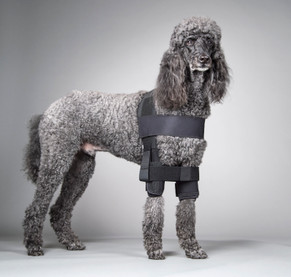09/11/2024
Help Your Dog Manage Medial Shoulder Syndrome (MSS) or Instability (MSI)
As a devoted dog mom, nothing is more important than ensuring the health and well-being of your furry friend. If your dog has been diagnosed with Medial Shoulder Syndrome (MSS) or Medial Shoulder Instability (MSI), you may feel concerned or uncertain about what lies ahead. The good news is that with proper understanding, treatment, and care, many dogs can recover from MSS or MSI and go on to live happy, active lives. Let’s explore the symptoms, causes, and treatment options available to help your beloved pet manage these conditions and achieve the best possible outcome.
Understanding MSS and MSI
Medial Shoulder Syndrome (MSS) and Medial Shoulder Instability (MSI) can affect dogs of all breeds and ages. These conditions typically result from overuse of the shoulder, especially in active dogs who love to run, jump, and play. However, slips, falls, or other traumas can also contribute to the discomfort and dysfunction of the joint. Left untreated, shoulder instability can lead to osteoarthritis, a degenerative joint disease that can significantly impact your dog’s mobility and quality of life.
Recognizing the Symptoms
As a vigilant dog mom, it’s essential to be aware of the signs and symptoms of MSS and MSI. Early detection and intervention can make a significant difference in your dog’s recovery journey. Some common symptoms to look out for include:
- Lameness or Limping: One of the most noticeable symptoms is when your dog starts limping or showing signs of lameness, especially after exercise or activity. This may be intermittent at first but can become more pronounced over time.
- Discomfort or Pain: Your dog may exhibit signs of discomfort, such as whining, yelping, or being reluctant to use the affected leg. They might also lick or chew at the shoulder area, indicating pain or irritation.
- Reduced Range of Motion: You may notice that your dog is less willing to stretch or extend their leg fully. They might have difficulty reaching up or jumping onto furniture, which they used to do effortlessly.
- Swelling or Inflammation: In some cases, you may observe visible swelling around the shoulder joint. This could be a sign of inflammation, which often accompanies shoulder instability.
- Performance Issues: If your dog is an active participant in canine sports or agility, you may notice a decline in their performance. They might struggle with maneuvers that require shoulder flexibility and strength.
Causes of MSS and MSI
Understanding what causes MSS and MSI can help in preventing these conditions from developing or worsening. The most common causes include:
- Overuse and Repetitive Strain: Just like in humans, repetitive movements and overuse can strain a dog’s shoulder, especially in high-energy breeds or those involved in competitive sports. Dogs that frequently jump, turn sharply, or run at high speeds are more prone to shoulder injuries.
- Trauma or Injury: Accidents such as falls, slips, or sudden impact can lead to shoulder instability. Even a playful romp in the park that results in a bad fall can cause damage to the ligaments and tendons in your dog's shoulder.
- Age and Degeneration: As dogs age, their joints and ligaments can naturally weaken, making them more susceptible to conditions like MSS and MSI. Senior dogs are at a higher risk, particularly if they have a history of joint problems.
- Genetic Predisposition: Some dog breeds are genetically predisposed to joint problems, including shoulder instability. Breeds such as Border Collies, Labrador Retrievers, and German Shepherds may have a higher risk.
Treatment Options for MSS and MSI
The treatment for MSS and MSI depends on the severity of the condition. Generally, dogs with MSS fall into three categories: mild, moderate, and severe. Let’s explore the treatment options for each.
- Mild MSS: Conservative Management
- Mild cases involve inflammation without significant changes to the shoulder structure. Treatment typically includes rehabilitation therapy, such as physiotherapy exercises, massage, and cold or heat therapy to reduce inflammation.
- Shoulder Support System: The use of a shoulder support system, like the DogLeggs’™ Shoulder Stabilization System, is crucial. This support system helps stabilize the shoulder, limiting movement to allow proper healing of the joint. It is custom-made to fit your dog and provides comfort and stability during recovery.
- Anti-Inflammatory Medications: Your veterinarian may prescribe anti-inflammatory medications to manage pain and swelling.
- Activity Restriction: Limiting your dog’s activity is essential during the healing process to prevent further injury.
- Moderate MSS: Combined Approach
- Moderate cases involve disruption or fraying of the joint, tendon, and ligament. In these situations, a more comprehensive approach is needed.
- Surgical Intervention: Surgery may be necessary to repair the damaged tissues and restore stability to the shoulder joint.
- Post-Surgery Rehabilitation: Rehabilitation is critical post-surgery to strengthen the muscles around the joint and promote healing. This may involve hydrotherapy, controlled exercises, and laser therapy.
- Continued Use of a Shoulder Support System: A shoulder support system is vital to prevent re-injury and support the shoulder during the recovery phase.
- Severe MSS: Surgical and Reconstructive Treatment
- Severe MSS involves complete tears of the ligament and significant joint and tendon disruption. These cases require more intensive treatment.
- Reconstructive Surgery: Advanced surgical procedures may be required to reconstruct the damaged ligaments and stabilize the joint.
- Long-Term Rehabilitation: Extended rehabilitation therapy is often necessary to ensure a successful recovery. This may take several months and requires a dedicated approach from both the veterinarian and the pet owner.
- Permanent Support System Use: In some cases, dogs with severe MSS may need to use a shoulder support system long-term to maintain joint stability and prevent future injuries.
Outcomes and Recovery Expectations
The prognosis for dogs with MSS and MSI varies depending on the severity of the condition and the treatment provided. With proper care, many dogs can achieve a full recovery or significant improvement in their condition. Here’s what to expect:
- Mild Cases: Dogs with mild MSS generally have an excellent prognosis. With conservative treatment and the use of a shoulder support system, most dogs can return to their normal activities within a few weeks to months.
- Moderate Cases: Dogs with moderate MSS may require more extended rehabilitation and recovery time. However, with proper treatment, including surgery and a support system, many dogs regain a good range of motion and are able to resume their favorite activities.
- Severe Cases: Dogs with severe MSS face a more challenging recovery journey. However, with reconstructive surgery, ongoing rehabilitation, and consistent use of a support system, they can still achieve a significant improvement in mobility and quality of life.
Why Choose the DogLeggs’™ Shoulder Stabilization System?
The DogLeggs’™ Shoulder Stabilization System is highly recommended by veterinarians for managing and treating MSS or MSI. Made from high-quality, breathable fabric, this system is designed to provide comfort while limiting excessive shoulder movement, which is crucial for healing. It can be worn for several months with little to no discomfort to your dog.
Final Thoughts
Medial Shoulder Syndrome (MSS) and Medial Shoulder Instability (MSI) can be daunting diagnoses, but they are not insurmountable. With the right knowledge, early intervention, and appropriate treatment, your dog can recover and enjoy many more years of happy, tail-wagging moments. Remember, you’re not alone in this journey—work closely with your veterinarian, follow the prescribed treatment plan, and provide your dog with all the love and support they need. Your dog’s shoulder may be unstable now, but with time and care, their future is bright and full of potential.


